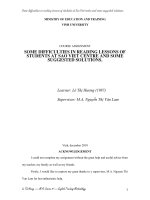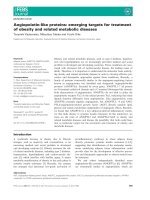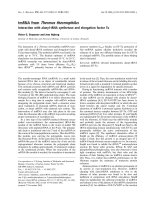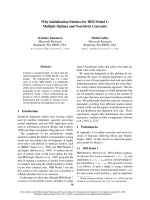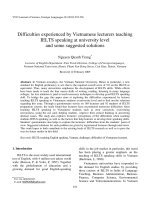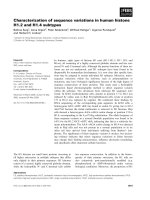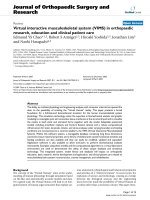Báo cáo " Difficulties experienced by Vietnamese lecturers teaching IELTS speaking at university level and some suggested solutions " pptx
Bạn đang xem bản rút gọn của tài liệu. Xem và tải ngay bản đầy đủ của tài liệu tại đây (64.89 KB, 5 trang )
VNU Journal of Science, Foreign Languages 26 (2010) 252-256
252
Difficulties experienced by Vietnamese lecturers teaching
IELTS speaking at university level
and some suggested solutions
Nguyen Quynh Trang
*
Lecturer of English Department -Fast Track Division, College of Foreign Languages,
Vietnam National University, Hanoi, Pham Van Dong Street, Cau Giay, Hanoi, Vietnam
Received 12 February 2009
Abstract. In Vietnam nowadays, the Vietnam National University, Hanoi in particular, a new
standard for English proficiency is set; that is the required overall score of 5.0 on the IELTS or
equivalent. Thus, many universities emphasize the development of IELTS skills. While efforts
have been made to teach the four macro skills of writing, reading, listening in many language
colleges, far less attention is paid to teach necessary techniques to develop good IELTS speaking
skill. To bridge the gap, this paper aims at exploring the difficulties experienced by lecturer
teaching IELTS speaking to Vietnamese students at university level and to find out the solutions
regarding this issue. Through a questionnaire survey on 189 lecturers and 92 students of IELTS
preparation courses, the study found that lecturers have encountered numerous difficulties when
teaching IELTS speaking to Vietnamese students such as error correction, overcoming
nervousness, using the cue card, helping students improve their critical thinking in answering
abstract issues. The study also explores lecturers’ perceptions of the difficulties when teaching
students IETLS speaking as well as the factors that help learners to develop their speaking skills.
Students’ questionnaire also helps to explore the lecturers’ difficulties from the students’ point of
view. Suggested solutions for each problem are given by experienced lecturers through interviews.
This work hopes to both contribute to the existing body of IELTS research as well as to pave the
way for future studies in this field.
Keywords: IELTS, teaching, English speaking, Vietnam, challenges, difficulties of Vietnamese lecturers.
1. Introduction
*
IELTS is the most widely used international
test of English, with 4 million test takers world
wide. (Benson, P. & Voler, P, 1997). Together
with the globalization of education and a
growing demand for good English-speaking
______
*
Tel.: 84-1696522927.
E-mail:
skills in the job market in particular, this trend
has been placing a greater emphasis on the
teaching of IELTS speaking skills in Vietnam
(Bachman, L, 1990).
Vietnamese universities have responded to
the demand for English studies by providing
those courses of IELTS in fields of Language
Teaching, Business Administration, Business
Finance, Computer Science, Environmental
Science and Telecommunications. In Vietnam
N.Q. Trang / VNU Journal of Science, Foreign Languages 26 (2010) 252-256
253
universities nowadays, the new standard for
English is set which some IELTS overall of 5.0
or equivalent. (Dörnyei, Z, 2002) According to
the 16+23 programs at Vietnam National
University, students should get certain score of
IELTS in order to be admitted to some major.
For general students, they should get around 4.5
IELTS (Brick, J, 1991). For the fast track
students, they should get above 6.5 IELTS in
field such as Information technology of
Vietnam National University. According to 322
program of the government, students should
also get 5.5 IELTS in order to apply for the
scholarship provided by the state to travel
overseas to study at English-medium
universities. Courses for those students are
offered at Hanoi University and the Foreign
Trade University. At Hanoi University, students
should get an overall of 6.0 IELTS in order to
apply or to transfer to some majors such as
Banking and finance, IT, Tourism, IBM etc. At
the Foreign Trade University, one of the
conditions that students can enter the master
course without having to take the exam is that
they have an overall IELTS score of 5.0 or
above. (Bachman, L, 1990).
At the Foreign Trade University, if the students
achieve band 6 of IELTS, they will have chance to
receive a scholarship sponsored by Bedfordshire
University of £1500. Therefore, IELTS is also a
crucial part of language learning and teaching at
universities in Vietnam.
IELTS speaking skill, as a new standard of
foreign language in Vietnam and regarded as
one of the most important skills to gain has
been taught at earlier stages in Vietnam
universities. (Brick, J, 1991). Despite its
importance, for many years, teaching IELTS
speaking has been undervalued and English
language lecturers have continued to teach
speaking just as a repetition of drills or
memorization of dialogues. (Briton, J, 1991).
Although an IELTS certificate is recognized by
more than 6000 institutions across 120
countries (Brown, A., & Hil, K, 2002), only
few research studies have been conducted about
IELTS teaching in Vietnam context (Gardner.
H,1999). There are even fewer ones carried out
on difficulties of Vietnamese lecturers in
teaching speaking skill in IELTS.
Therefore, this paper attempts to examine
the difficulties of lecturers when teaching
IELTS and to suggest suitable teaching
techniques to suit Vietnamese students for
effective IELTS teaching method.
This problem can be tackled through
answering the following questions:
1. From lecturers’ perspective, what are their
biggest difficulties when teaching IELTS speaking
to Vietnamese students at university level?
2. From students’ perspective, what are
lecturers’ difficulties when teaching IELTS
speaking?
3. What teaching techniques do lecturers
suggest to overcome those difficulties?
Teaching IELTS speaking skill in a foreign
language context such as Vietnam has some
potential difficulties. (Benson, P. & Voler, P,
1997). It is a matter of great concern that most
of our tertiary learners can not speak English
fluently even when they have learnt and have
been taught the language for a minimum of 7
years of their life i.e. from grade 6 to Upper
Secondary level. What are the reasons behind
it? For researchers in the field of English
language teaching and training the basic duty is
to observe, find, identify and determine these
difficulties through useful research tools such
as survey questionnaires, for the collection of
quantitative data and classroom observations,
and group interviews for the collection of
qualitative data.
The population of this study consisted of
university lecturers from various universities in
Hanoi. The students’ sample was chosen from 5
different universities and this facilitates the
process of the survey. The sample consisted of
92 students. The students took part in the
questionnaire survey to reveal what they think
are the difficulties of the lecturers in teaching
them IELTS speaking. The lecturers’ sample
N.Q. Trang / VNU Journal of Science, Foreign Languages 26 (2010) 252-256
254
consisted of 189 lecturers of English language
in Hanoi to participate in the survey. These
students and lecturers came from five
universities in Hanoi, namely: ULIS
(University of languages and international
studies), Vietnam National University (54
lecturers), HUT (Hanoi University of
Technology) (28 lecturers), NEU (National
Economics University(27 lecturers), Hanoi
University (27 lecturers), and Foreign Trade
University (23 lecturers). The questionnaires of
the students and lecturers are the same for
comparison purpose. There were 31 IELTS
speaking difficulties for the respondents to rate.
To achieve the goals of this study, the
researcher designed a questionnaire in a way
that it included four categories: difficulties in
teaching IELTS in general, difficulties in
teaching IELTS speaking part 1, difficulties in
teaching IELTS part 2, difficulties in teaching
IELTS part 3. The questionnaires, and the
observation revealed the difficulties facing by
lecturers in teaching IELTS speaking and some
of the solutions to those difficulties are
suggested by experienced lectures through
group interview.
In short, to answer research question
number 1 and 2, the following table sums up
the most common difficulties of lecturers when
teaching IELTS in different parts of the
speaking test:
\bmk
Part Difficulties
In general
Error correction
IELTS speaking part 1
Help the students overcome their nervousness right in the first 4 minutes
of the first part
IELTS speaking part 2
Helping students to use the cue card effectively
From lecturers’
perspective
IELTS speaking part 3
Help students improve their critical thinking in answering abstract issues
In general
Helping students to have a good self-study method for pronunciation at
home
IELTS speaking part 1
Helping students overcome the anxiety in IELTS speaking
IELTS speaking part 2
Helping students to utilize the time effectively.
From
students’
perspective
IELTS speaking part 3
Helping students improve their critical thinking in answering abstract issues.
fhj
To answer research question number 3,
various solutions suggested by the interviewed
lecturers include:
- To reduce the size of the IELTS class to
the smallest if it is possible.
- To make the IELTS classroom
environment less formal and more friendly, one
where students can make mistakes without
looking or sounding inept.
- To choose topic that relates to the students
and that is easy for the students to talk about.
- To encourage students not to be afraid of
making mistakes.
- To emphasize the use of graphic
organizers to help the students to plan a clearer
and more structural
- To giving helpful feedback on students’
work and assignments through out various
methods such as whole-group feedback;
assignment return sheets; model answers;
posting comments of common errors.
- To try to correct students only when the
meaning is unclear and results in
communication breakdown.
To tell the students to use as much of
English as they can, avoid to speak Vietnamese
in class.
- The students’ talking time should be more
than the teacher’s talking time
- To make the students aware that they can
use the cue card as the structure of the talk.
- To ask the students to use some IT
application at home to help them to improve
their pronunciation, they can record their own
speech, listen to the native speaker and imitate
them.
N.Q. Trang / VNU Journal of Science, Foreign Languages 26 (2010) 252-256
255
It is hoped that this thesis will shed some
light into the area of teaching IELTS
preparation courses (IELTS speaking in
particular) of lecturers of English in Vietnam.
As such it is hoped that a larger research project
in this area would be conducted so that even
more effective IELTS preparation could be
achieved.
2. Acknowledgments
First of all, I would like to heartily express
my deepest appreciation and gratitude to my
Supervisor, Dr To Thi Thu Huong, who is
always willing to work hard to give her expert
guidance, knowledge, insight and time. Her
never ending support, encouragement, guidance
and patience have been invaluable to me. Her
leadership skills, teaching excellence, her
genuine compassion and integrity as a scholar
have taught me so much about what really
matters in lecturer education and in life.
Appreciation is also extended to my close
relative Mr. Lân Trung for his valuable advice
and comments on strengthening this work.
I would particularly like to thank the
members of the English Department at ULIS,
who also took part in an earlier study in the
piloting of a continuous improvement
framework. Grateful acknowledgement goes to
all students who were enthusiastic participants
in the activities. I am very grateful for their
patience and prompt responses to questions
related to my work.
References
[1] Bachman, L, Fundamental Considerations in Language
Testing, Oxford University Press, 1990
[2] Benson, P. & Voler, P. Autonomy and Independence in
Language Learning. Oxford University Press (1997)
[3] Brick, J. Vietnam, a Handbook in Intercultural
Communication. NCELTR: Macquarie University Press,
1991.
[4] Briton, J. Language and learning in Vietnam. University
of Miami Press, 1999
[5] Brown, A., & Hil, K. “Interviewer style and candidate
performance in the IELTS oral interview”, in EA Journal
IELTS Research Reports, 2002
[6] Dörnyei, Z. Motivational strategies in the language
classroom. Cambridge Press, 2001.
[7] Gardner, H. Learning Vietnamese Style; from To Open
Minds: Vietnamese clues to the Dilemma of
Contemporary Education. New York: Basic Books Inc.,
1999
Nghiên cứu về những khó khăn của giảng viên Việt Nam
trong dạy kỹ năng nói IELTS ở cấp độ
Đại học và một vài giải pháp
Nguyễn Quỳnh Trang
Giảng viên Tổ Chất lượng cao, Khoa Sư phạm tiếng Anh, Trường Đại học Ngoại ngữ,
Đại học Quốc gia Hà Nội, Đường Phạm Văn Đồng, Cầu Giấy, Hà Nội, Việt Nam
Trong sự chuyển mình của Việt Nam hiện nay, các trường Đại Học ở Việt Nam đã đặt ra mức
chuẩn mới cho trình độ tiếng Anh của sinh viên theo chứng chỉ IELTS tạo ra đẳng cấp mới cho lĩnh
vực dạy và học tiếng Anh ở các trường Đại Học ở Việt Nam. Sự gia nhập quốc tế và sự cạnh tranh
toàn cầu khiến cho việc dạy và học kỹ năng nói trong IELTS vô cùng quan trọng và cấp thiêt trong các
trường Đại học ở Việt Nam. Trước đây, rất nhiều bài đã nghiên cứu về các kỹ năng nghe, nói, đọc viết
N.Q. Trang / VNU Journal of Science, Foreign Languages 26 (2010) 252-256
256
nói chung, có rất ít bài nghiên cứ u về kỹ năng dạy và học IELTS nói riêng. Nghiên cứu về kỹ năng
dạy nói IELTS lại càng hiếm. Vì vậy, bài này hi vọng sẽ đem tới kết quả nhiên cứu đáng tin cậy về
vấn đề nóng hổi này. Qua việc nghiên cứu và điều tra 189 giảng viên và 92 từ 5 trường Đại học khác
nhau, nghiên cứu đã cho thấy giảng viên Việt Nam gặp rất nhiều khó khăn trong việc dạy kỹ năng nói
trong IELTS, khó khăn chủ yếu tập trung vào sự thiếu tự tin của sinh viên do 12 năm học ở phổ thông
rất ít được nói tiếng Anh, sửa lỗi sai, giúp sinh viên sử dụng bẳng gợi ý hiệu quả trong phần 2 kỳ thi
nói IELTS và giúp sinh viên có tư duy phê phán để có những câu trả lời sâu cho các câu hỏi trìu tượng
trong phần 3 của kỳ thi nói IELTS. Một vài giải pháp gợi ý đã được đưa ra qua phần phỏng vấn nhóm
các giảng viên có kinh nghiêm dạy kỹ năng nói IELTS
